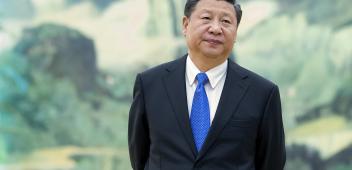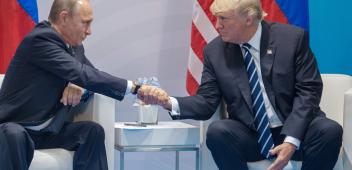Extract from 'The China choice: why America should share power'
This is an extract from The China choice: why America should share power by Hugh White, published by Black Inc. The China choice will be released on Monday 6 August, RRP $29.99, and is also available as an ebook. http://www.blackincbooks.com/books/china-choice

Executive Summary
The China Choice: Why America Should Share Power
By Hugh White
Australia’s future depends on America and China. They are now the world’s two richest and strongest countries, and they are by far the two most important countries in the world to us. If they get on well, Asia’s future is bright and Australia has a good chance of peace and prosperity. If they get on badly, our future is bleak. Their economies are deeply intertwined, and day-to-day business between them is generally managed well. But as China’s power grows, there is an increasing undercurrent of rivalry that raises big questions about their long-term relationship, and what it means for the future. Will they find a way to live in peace with each other, or will they become strategic competitors – even enemies? Will Asia enjoy many more decades of peace and stability, or will it be devastated by conflict?
The answers are far from clear. Peace and stability are certainly possible, but the risk of rivalry and conflict is also quite real. Which it will be depends more than anything else on choices that will be made over the next few years in Washington and Beijing. Each country will have to decide how far it is willing to adjust its ambitions and aspirations to accommodate the other. Either one of them can push the relationship towards rivalry by asserting its ambitions too ruthlessly. Only together can they make the mutual concessions needed to pull back towards cooperation. Both, therefore, share responsibility for avoiding disaster.
This book is about America’s part in that shared responsibility.
The choices for America are quite urgent: Washington and Beijing are already sliding towards rivalry by default, seeing each other more and more as strategic competitors. The relationship between the world’s two richest and strongest states will always be competitive; the question is whether that competition still allows them to trade and invest with each other, cooperate to solve shared problems, and contribute to maintain a stable international order.
Competition becomes dangerous when concerns about status and security become so intense that they preclude cooperation in other areas, and the quest for political, strategic or military advantage becomes the overriding priority. This is the path down which America and China are already taking the first steps.
While for the most part their overt language remains cautious, they are building their forces and adapting their military plans specifically with the other in mind; seeking support from other Asian countries; and seeing regional questions, like the South China Sea disputes, more and more through the lens of rivalry.
The further this goes on, the harder it will be to change course and choose cooperation.
America’s choices about China are among the most important and difficult it has ever faced. They are important because serious rivalry with China would be very costly and dangerous, and conflict could be catastrophic. They are difficult because they touch on deep questions about America’s role in the world, and therefore about America itself. China raises these questions because, in one fundamental way, it is different from any country America has ever dealt with: it is richer and more powerful.
Within a few years China is set to have a larger economy than America, becoming the first country to do so since America overtook Britain in the 1880s. By mid-century, on some estimates, China’s GDP could be double America’s.
China’s wealth changes America’s relationship with it because the old saying is right: ultimately, wealth is power. America itself has shown this to be true, with its global power built on its economic preponderance. Now China’s swift economic rise is driving a rapid shift in relative strategic and political power.
China still lags well behind America on many measures, but in almost every case the long-term trends are going its way. China does not even need to overtake America to pose a very serious challenge: its economy is already larger relative to America’s than the Soviet Union’s ever was. That makes China, in the long run, more formidable than the Soviets were at the height of the Cold War. And in Asia, where Chinese and American power meet, China enjoys many asymmetric advantages.
This growing strength confronts America with unprecedented choices. For forty years, both the US–China relationship and the Asian strategic order have been built on Chinese acceptance of America’s superior power. At first this simply reflected a recognition of reality. When Nixon met Mao in 1972, China’s economy was less than one-twentieth the size of America’s. Beijing calculated then that it had no choice, in its own interest, but to accept an unequal relationship. In doing so, China relinquished its status as a great power in Asia, but only ever as a temporary expedient. Now that it is stronger, the calculations have changed. China believes it has the power to veto decisions it does not accept, and it is willing to use that power.
These are ultimately matters of status and identity. The Chinese feel towards their country, with all its achievements and for all its faults, in a way not so very different from the way Americans feel towards theirs. They, too, believe their country is exceptional and destined to lead. They see China as a great power. For nearly two centuries, China has been deprived of that status by other powers. Now that it has grown wealthy and strong again, nothing is more important to China than to reclaim its place as a leader in Asia. The Chinese will continue to avoid unnecessary friction and minimise the risk of confrontation. But they will not relinquish their country’s claim to status as a great power – even if that leads to conflict. The implications of this for America are simple and very significant. If America tries to preserve the status quo and avoid fundamental change in the relationship, it will be choosing to accept China as a strategic rival.
The need for a decision seems to have emerged very suddenly. China’s economic growth has been obvious, but not where it has been leading. Only a few years ago, serious people were talking of America as a new Rome, whose unchallengeable power would make this century even more an American Century than the last. America has been the world’s richest and most powerful nation for so long that it seems inevitable, and essential to its nature, that it will remain so. It is indeed quite wrong to see America as a country in decline, because in itself America remains a remarkably vibrant and innovative society and economy. But it is equally wrong to imply, as American political leaders often do, that its relative position in the world of power is not changing. This overlooks the simple mathematical fact that when we talk about relative power, America’s trajectory is only half the story, and not the half that matters right now. The shift in power is being driven by China’s rise, not by America’s decline. There is not much America can do about it.
Likewise, it has been easy to assume that China will continue to accept the existing US-led global and regional order. China has appeared too preoccupied with economic growth and social stability to bother about challenging US leadership, and has not shown the ideological fervour or territorial appetites that have driven ambitious rising powers in the past. For reasons of its own, China has been happy for America to underestimate its power and ambitions as these have grown. But over the past couple of years, China’s challenge has become clear, and so has America’s need to decide how to respond.
Essentially, America has three options. It can resist China’s challenge and try to preserve the status quo in Asia. It can step back from its dominant role in Asia, leaving China to attempt to establish hegemony. Or it can remain in Asia on a new basis, allowing China a larger role but also maintaining a strong presence of its own. Most Americans assume that the first of these options is the only choice. Only a few take the second option seriously, although that could change. Most don’t even consider the third.
The China choice explores the alternatives and in particular the third option, in order to argue that it is the one that best serves American interests. Many people doubt that the third option really exists. They assume that there are really only two alternatives. The argument goes that unless America maintains its benevolent leadership of Asia, the region will inevitably fall under Chinese leadership, which is likely to be much less benevolent. If that were true, America would have to choose between defending its leadership in Asia or surrendering the region to Chinese domination. The argument for defending the status quo would then be very strong.
I argue that over the next few decades neither America nor China will be strong enough to lead Asia in the way America has done since 1972. Each will be able to deny leadership to the other. The hope that America can maintain uncontested leadership in Asia is therefore as illusory as the fear that China will be able to dominate Asia in its place.
In truth, any attempt by either Beijing or Washington to dominate will lead to sustained and bitter strategic rivalry, imposing huge economic costs and a real risk of catastrophic war. Neither side could win, and both would stand to lose a great deal – but it could easily happen. Strategic competition quickly builds its own momentum, escalating to the point where war can seem inescapable. War between the United States and China is already a clear and significant danger, one that will grow if rivalry increases. This is the most important issue at stake in America’s China choice. Asia’s alternative futures are not American or Chinese supremacy. They are escalating rivalry, or some form of great-power accommodation that constrains that rivalry. America’s real choice is not between dominating or withdrawing from Asia: it is between taking China on as a strategic rival, or working with it as a partner.
The third option carries many obvious risks, which would quickly rule it out of contention were it not for the greater risks that flow from the alternatives. Moreover, this option can only be realised if America and China are willing to compromise with each other. Neither side will find that easy. For China it will mean abandoning hopes to lead Asia and accepting a strong US presence there indefinitely. For America it will mean accepting that its unique leadership role is no longer feasible, and learning to work with China as a partner in a way that America has never done with another country before – and certainly not with one so different from it. But this is the kind of choice America must now consider.
This is an extract from The China choice: why America should share power by Hugh White, published by Black Inc. The China Choice will be released on Monday 6 August, RRP $29.99, and is also available as an ebook. http://www.blackincbooks.com/books/china-choice



